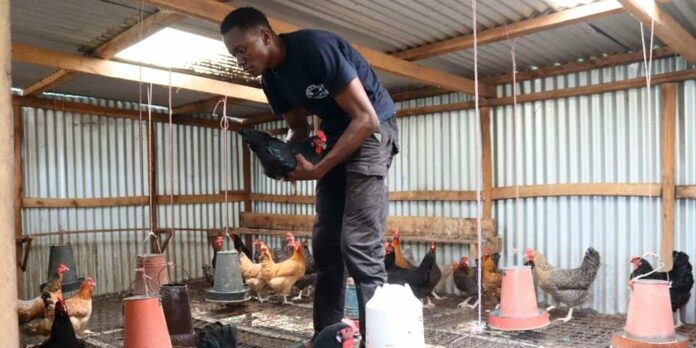Emmanuel Omondi is a poultry farmer based in Homa Bay county who started farming after losing his accountant job at a hotel in Nairobi in 2017.
His chicken farm in Rabuor Masawa village hosts 350 birds, which are reared primarily for meat. Omondi sells both whole chicken and pieces from his shop based on the Homa Bay-Rongo road.
“Selling slaughtered chickens guarantees profits. Parts like heads, gizzards, and even eggs are sold separately,” he said.
Omondi started with 45 birds with the intention of producing and selling chicks. He bought each at Sh35 and constructed the coop, which cost him Sh75,000.
However, things did not work out for him as the cost of feed was high, and he could not make enough profits to expand his business.
Poultry farmer’s advice: How to raise worms for your chicken
He had to look for cheaper alternative sources of nutrients for his birds. Omondi feeds his birds a combination of maize, maize bran, germ, hydroponic feeds, and worms. He has a special unit for Italian worms on his farm.
He also gets processed pallets from feed manufacturers. He noted that not all processed feeds are a complete diet, as manufacturers claim.
To ensure the birds remain healthy, Omondi supplements the processed feeds with organic substances and grain matter, which he says is highly nutritious and cheap.
He sources brans and germ from big millers who are keen on aflatoxin levels in maize. He buys a 50-kg bag of the bran at Sh 700 and mixes it with processed feeds at a ratio of 1:2.
Omondi notes the formula is cheaper than using pure feeds. His birds consume up to 45 kilos of feed daily. Sometimes he feeds the chicken with hydroponics, sorghum, and rice.
He noted that sorghum and rice are prone to mould which can make the chicken sick. To keep diseases away, Omondi vaccinates his chicken.
Diary of a poultry farmer: The dos and don’ts of vaccination
Besides accounting, Omondi is a trained farmer on good poultry practices by an organization called Practical Action.









